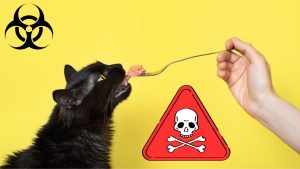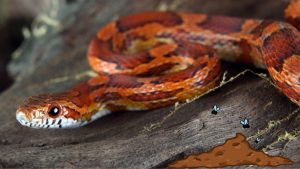⚠ Please note that information supplied on this page should not be taken as medical advice and you should always speak with a veterinarian professional before making any decisions on your pets!
As dog owners, we all want to give our furry friends the best possible care, including the food we provide them. However, not all human foods are safe for dogs to consume. In fact, some foods can be toxic and even fatal to dogs. It’s important to be aware of these harmful foods and to take steps to prevent your dog from ingesting them, but what foods are toxic to dogs?
Understanding dog digestion is crucial in recognizing which foods are safe for dogs and which are not. Dogs have a different digestive system than humans and cannot process certain foods the same way we can. Foods that are safe for humans, such as chocolate or grapes, can be toxic to dogs. It’s important to be aware of the common food items that are toxic to dogs and to avoid feeding them to your furry friend.
Key Takeaways
- Some human foods can be toxic and even fatal to dogs
- Understanding dog digestion is crucial in recognizing which foods are safe for dogs and which are not
- Being aware of common food items that are toxic to dogs and avoiding feeding them to your furry friend can prevent accidental ingestion and potential harm.
Understanding Dog Digestion
As pet owners, we want to make sure our furry friends are healthy and happy. One important aspect of their health is their digestion. Understanding how your dog’s digestion works can help you make informed decisions about their diet.
Dogs have a different digestive system than humans. For example, they have a shorter digestive tract and a more acidic stomach. This means they can handle bacteria that would make us sick, but it also means certain foods can cause them problems.
One common issue is lactose intolerance. While some dogs can tolerate milk and dairy products, many cannot. This is because they lack the enzyme needed to digest lactose, a sugar found in milk. Consuming too much lactose can cause stomach upset and diarrhea.
Another concern is pancreatitis. This is a condition where the pancreas becomes inflamed and can’t function properly. High-fat foods are a common trigger for pancreatitis in dogs. This is why it’s important to avoid feeding them foods like bacon, sausage, and fried foods.
It’s also important to be aware of foods that are toxic to dogs. Some common examples include grapes, onions, garlic, and chocolate. These foods can cause a range of symptoms, from stomach upset to organ damage.
In summary, understanding your dog’s digestion is an important part of keeping them healthy. By avoiding foods that can cause problems and providing a balanced diet, you can help ensure your furry friend stays happy and healthy.
Common Food Items Toxic to Dogs
As responsible dog owners, we must be aware of the foods that can be harmful to our furry friends. While some foods may seem harmless, they can cause serious health issues or even death in dogs. Here are some common food items that are toxic to dogs:
- Chocolate: Chocolate contains theobromine, which can cause vomiting, diarrhea, seizures, and even death in dogs. The darker the chocolate, the more dangerous it is for dogs.
- Onions and Garlic: Onions and garlic contain compounds that can damage a dog’s red blood cells, leading to anemia. Symptoms of onion and garlic toxicity include weakness, vomiting, and breathing difficulties.
- Grapes and Raisins: Grapes and raisins can cause kidney failure in dogs. Symptoms of grape or raisin toxicity include vomiting, diarrhea, and lethargy.
- Macadamia Nuts: Macadamia nuts can cause vomiting, tremors, and hyperthermia in dogs. Symptoms usually appear within 12 hours of ingestion and can last up to 48 hours.
- Xylitol: Xylitol is a sugar substitute found in many sugar-free gums and candies. It can cause insulin release, leading to hypoglycemia (low blood sugar) in dogs. Symptoms of xylitol toxicity include vomiting, loss of coordination, and seizures.
- Avocado: Avocado contains persin, which can cause vomiting and diarrhea in dogs. The pit and skin of the avocado can also cause intestinal blockages in dogs.
- Alcohol: Alcohol can cause vomiting, diarrhea, difficulty breathing, and even death in dogs. Even small amounts of alcohol can be dangerous to dogs.
- Coffee: Coffee contains caffeine, which can cause restlessness, rapid breathing, heart palpitations, and muscle tremors in dogs. In severe cases, caffeine can cause seizures and death.
- Yeast Dough: Yeast dough can expand in a dog’s stomach, causing bloating and abdominal pain. The ethanol produced by the yeast can also cause alcohol poisoning in dogs.
- Salt: Excessive salt intake can lead to dehydration, vomiting, diarrhea, and even death in dogs. Avoid giving your dog salty snacks or human food that is high in salt.
- Chives: Chives contain compounds that can damage a dog’s red blood cells, leading to anemia. Symptoms of chive toxicity include weakness, vomiting, and breathing difficulties.
- Candy and Baked Goods: Candy and baked goods that contain chocolate, raisins, or xylitol can be harmful to dogs. Make sure to keep these items out of reach of your furry friend.
- Tomatoes: Tomatoes contain solanine, which can cause gastrointestinal upset and weakness in dogs. The leaves and stems of the tomato plant are also toxic to dogs.
- Mushrooms: Some mushrooms can be toxic to dogs and cause symptoms such as vomiting, diarrhea, and seizures. Make sure to keep your dog away from wild mushrooms.
- Bones: Cooked bones can splinter and cause choking, blockages, or internal injuries in dogs. Avoid giving your dog cooked bones and supervise them when they are chewing on bones.
- Corn: Corn is not toxic to dogs, but it is difficult for them to digest and can cause gastrointestinal upset. Avoid giving your dog corn or corn-based products.
- Almonds and Cherries: Almonds and cherries contain cyanide, which can be toxic to dogs. Symptoms of cyanide poisoning include difficulty breathing, dilated pupils, and shock.
- Rhubarb and Spinach: Rhubarb and spinach contain oxalates, which can cause kidney damage in dogs. Symptoms of oxalate toxicity include vomiting, diarrhea, and lethargy.
- Ice Cream: Ice cream contains sugar and fat, which can cause gastrointestinal upset and obesity in dogs. Some dogs are also lactose intolerant and may experience diarrhea or other digestive issues after eating ice cream.
- Raw or undercooked meat, bones, and fish: Can harbor bacteria, parasites, or cause digestive obstructions or injuries.
- Dairy products: Some dogs are lactose intolerant and may experience digestive upset.
- Nuts: Certain nuts, like almonds, walnuts, and pecans, can cause digestive upset or pancreatitis.
- Raw eggs: Can lead to biotin deficiency and bacterial contamination.
- Salt: Excessive salt intake can lead to electrolyte imbalance and sodium ion poisoning.
- Mushrooms: Some mushrooms contain toxins that can affect various systems in a dog’s body.
- Chives: Similar to onions and garlic, chives contain substances that can damage red blood cells.
- Cinnamon: Can irritate a dog’s mouth and digestive system.
- Nutmeg: Contains a compound called myristicin, which can be toxic to dogs.
- Artificial sweeteners (other than xylitol): Sweeteners like sorbitol, aspartame, and sucralose can be harmful in large amounts.
- Yeast dough: Consuming raw yeast dough can cause bloating and alcohol poisoning.
- Avocado pits and skins: These parts of the avocado contain persin, which is toxic to dogs.
- Rhubarb: Rhubarb leaves contain oxalates, which can affect the dog’s kidneys and nervous system.
- Tomato leaves and stems: These contain solanine, which can cause gastrointestinal upset and weakness.
- Potato leaves, stems, and green potatoes: Contain solanine and can be toxic to dogs.
- Persimmons: Seeds and skins of persimmons can cause intestinal blockages.
- Chocolates and candies sweetened with xylitol: Double danger as they contain both chocolate and xylitol.
- Apricot, cherry, peach, and plum pits: The pits contain cyanide, which is toxic to dogs.
- Tuna (in large amounts): Can lead to mercury poisoning and vitamin E deficiency.
- High-fat foods: Excessive consumption can lead to pancreatitis.
- Cooked bones: Cooked bones can splinter and cause choking, digestive tract punctures, or obstructions.
- Coffee grounds: Contains caffeine, similar to chocolate.
- Alcoholic beverages: Highly toxic and can cause liver damage and other serious complications.
- Fatty foods: Can cause pancreatitis and digestive upset.
- Mustard seeds: Ingesting large amounts of mustard seeds can cause digestive distress.
- Persimmons: Can cause gastrointestinal obstruction.
- Toothpaste and mouthwash: Contain xylitol, which is toxic to dogs.
- Energy drinks: High caffeine content can cause severe reactions in dogs.
- Fruit pits and seeds: Can contain cyanide, which is toxic.
- Rhubarb leaves: Contain oxalates, which can affect the kidneys and nervous system.
- Baby food (with onion or garlic powder): May contain ingredients toxic to dogs.
- Fertilizers and pesticides: Can be toxic if ingested in large quantities.
- Human medications: Many human medications can be toxic to dogs. Always consult a veterinarian before giving any medication.
- Chewing gum: Often contains xylitol, which is toxic to dogs.
- Dishwashing detergent: Can cause digestive upset if ingested.
- Raw yeast: Can cause alcohol poisoning in dogs.
- Tobacco: Contains nicotine, which can be toxic to dogs.
- Nut oils: Some nut oils, like walnut oil, can cause digestive upset.
- Corn on the cob: Can cause digestive obstructions if swallowed.
- Sugary foods: Excessive sugar consumption can lead to obesity, dental problems, and other health issues.
- Persimmon seeds: Can cause intestinal blockages.
In conclusion, it is important to be mindful of the foods that can be harmful to our dogs. If you suspect that your dog has ingested a toxic food item, contact your veterinarian immediately.
Symptoms of Food Poisoning in Dogs

When dogs consume toxic food, they may exhibit various symptoms that can range from mild to severe. As pet owners, we must be aware of the signs of food poisoning in dogs to take prompt action and seek veterinary care if necessary.
Some of the common symptoms of food poisoning in dogs include vomiting, diarrhea, and abdominal pain. Dogs may also experience weakness, lethargy, and depression. In severe cases, dogs may have seizures, tremors, or difficulty breathing. They may also become comatose or experience hyperthermia.
Food poisoning can also cause dehydration and excessive thirst in dogs. It can lead to anemia, kidney failure, and other serious health complications. Therefore, it is essential to seek veterinary care if your dog exhibits any of these symptoms after consuming toxic food.
It is worth noting that different foods can cause different symptoms in dogs. For instance, if a dog consumes chocolate, it may exhibit symptoms such as tremors, hyperactivity, and seizures. On the other hand, if a dog ingests onions or garlic, it may experience anemia, weakness, and lethargy.
In conclusion, as pet owners, we must be aware of the symptoms of food poisoning in dogs and take prompt action to seek veterinary care if necessary. By doing so, we can ensure that our furry friends receive the necessary treatment and care to recover from food poisoning.
Understanding the Severity of Toxic Foods
As dog owners, we all want the best for our furry friends. We love to share our meals with them, but some human foods can be dangerous for dogs. It’s important to understand the severity of toxic foods and their potential effects on our pets.
Consuming toxic foods can lead to serious health problems, including liver and kidney failure, anemia, coma, and even death. It’s essential to be aware of what foods to avoid and to keep them out of reach of our pets.
Some toxic foods affect a dog’s heart rate and can cause fever. For example, chocolate contains theobromine, which can cause vomiting, diarrhea, and increased heart rate. In severe cases, it can lead to seizures and death.
Onions, garlic, and chives can cause hemolytic anemia, a condition that destroys red blood cells. Symptoms include weakness, lethargy, and pale gums. Grapes and raisins can cause kidney failure, which can lead to vomiting, diarrhea, and lethargy.
It’s important to note that the severity of the symptoms can vary depending on the size of the dog and the amount of toxic food consumed. If you suspect that your dog has eaten something toxic, it’s crucial to seek veterinary attention immediately.
In conclusion, understanding the severity of toxic foods and their potential effects on our pets is essential. By being aware of what foods to avoid and keeping them out of reach of our pets, we can help ensure their health and well-being.
Dangerous Ingredients in Human Foods
As dog owners, we all want to keep our furry friends happy and healthy. Sometimes, we may be tempted to share our food with them. However, some human foods contain ingredients that can be toxic to dogs. Here are some ingredients to watch out for:
Xylitol
Xylitol is a sugar substitute that is commonly found in sugar-free gum and candy, as well as some baked goods and toothpaste. Xylitol can cause a rapid insulin release in dogs, which can lead to hypoglycemia (low blood sugar). Symptoms of xylitol poisoning in dogs include vomiting, loss of coordination, and seizures.
Fruits
While many fruits are safe for dogs to eat, some can be toxic. Grapes and raisins, for example, can cause kidney failure in dogs. Avocados contain persin, which can cause vomiting and diarrhea in dogs. Additionally, the pits of some fruits, such as cherries and apricots, contain cyanide, which is toxic to dogs.
Yeast
While small amounts of bread are generally safe for dogs to eat, raw bread dough can be dangerous. When ingested, the yeast in the dough can ferment in the dog’s stomach, causing it to expand. This can lead to bloating, abdominal pain, and potentially life-threatening complications.
Theobromine
Theobromine is a compound found in chocolate. While delicious to us, it can be toxic to dogs. Theobromine can cause vomiting, diarrhea, and restlessness in dogs. In severe cases, it can lead to seizures and even death.
Solanine
Solanine is a toxin found in potatoes and tomatoes. While the flesh of these fruits is safe for dogs to eat, the leaves, stems, and unripe fruit contain solanine, which can cause gastrointestinal upset, weakness, and confusion in dogs.
Other Sweeteners
Other sweeteners, such as stevia and erythritol, are generally safe for dogs to eat in small amounts. However, some sugar substitutes, such as saccharin, can be toxic to dogs. Symptoms of saccharin poisoning in dogs include vomiting, diarrhea, and muscle tremors.
As responsible dog owners, it is important to be aware of the potential dangers of feeding our furry friends human food. When in doubt, it is always best to stick to dog-specific treats and foods.
Safe Alternatives for Dogs
As pet owners, we always want to make sure our dogs are healthy and happy. One way to do this is by providing them with safe and healthy alternatives to foods that may be toxic to them. Here are some safe alternatives for dogs:
Fruits
Fruits are a great source of vitamins and fiber for dogs. Some safe fruits for dogs include:
- Apples (without seeds)
- Bananas
- Blueberries
- Watermelon (without seeds)
- Pineapple (without skin or core)
Remember to always remove any seeds or pits, as they can be harmful to dogs.
People Food
While we may be tempted to share our food with our furry friends, some human foods can be harmful to dogs. Here are some safe alternatives for dogs:
- Carrots
- Green beans
- Sweet potatoes
- Cooked chicken or turkey (without seasoning)
- Plain, unsweetened yogurt
Avoid giving your dog any foods that are high in fat or salt.
Bread
Bread can be a tasty treat for dogs, but some types of bread can be harmful to them. Here are some safe alternatives for dogs:
- Whole wheat bread
- Brown rice
- Oatmeal
Avoid giving your dog any bread that contains raisins, garlic, or onions.
Raw Meat
Raw meat can be harmful to dogs, as it may contain harmful bacteria. Here are some safe alternatives for dogs:
- Cooked chicken or turkey (without seasoning)
- Cooked beef or pork (without seasoning)
- Cooked fish (without bones)
Always make sure the meat is cooked thoroughly and does not contain any bones.
Pears
While pears are safe for dogs to eat, they can be difficult for them to digest. Here are some safe alternatives for dogs:
- Apples (without seeds)
- Blueberries
- Watermelon (without seeds)
- Pineapple (without skin or core)
Remember to always remove any seeds or pits, as they can be harmful to dogs.
By providing our dogs with safe and healthy alternatives to foods that may be toxic to them, we can help keep them healthy and happy.
When to Contact a Vet
If you suspect that your dog has ingested something toxic, it is important to contact your veterinarian immediately. Time is of the essence when it comes to treating poisoning in dogs, and prompt veterinary care can save your pet’s life.
In addition to contacting your veterinarian, you can also call the ASPCA Animal Poison Control Center at (888) 426-4435 or the Pet Poison Helpline at (855) 764-7661 for guidance on what to do next. These organizations have veterinary toxicologists available 24/7 to provide advice on how to handle potential poisoning situations. Alternatively if you are in the UK you can call the Animal Poison Line on 01202 509000
When you contact a vet or a poison control center, be prepared to provide information about your dog, including their breed, age, weight, and any symptoms they are experiencing. You should also be ready to provide information about the substance your dog ingested, including the amount and the time of ingestion.
It’s important to remember that not all substances are toxic to dogs, and some may only cause mild symptoms. However, it’s always better to err on the side of caution and seek veterinary care if you suspect your dog has ingested something harmful.
If your dog has ingested medication, it is important to bring the medication container with you to the vet. This will help the veterinarian determine the appropriate treatment for your pet.
Remember, time is of the essence when it comes to treating poisoning in dogs. Don’t wait to seek veterinary care if you suspect your dog has ingested something toxic.
Preventing Accidental Ingestion
As responsible pet owners, we want to keep our furry friends safe from harm. One way to do this is by preventing accidental ingestion of toxic substances. Here are some tips to help keep your dog safe:
Keep People Foods Out of Reach
Many human foods are toxic to dogs, including chocolate, grapes, onions, garlic, and avocado. It’s important to keep these foods out of reach of your dog. Store them in cabinets or on high shelves where your dog can’t get to them. Make sure your guests know not to feed your dog any people food, and keep an eye on your dog during parties or gatherings.
Be Careful with Toothpaste
Toothpaste contains xylitol, a sugar substitute that is toxic to dogs. Make sure you use a toothpaste that is specifically formulated for dogs, and keep your human toothpaste out of reach.
Dispose of Coffee Grounds Properly
Coffee grounds contain caffeine, which is toxic to dogs. Make sure you dispose of your coffee grounds properly, and keep them out of reach of your dog. If you have a compost bin, make sure it’s sealed and inaccessible to your dog.
Avoid Using Onion Powder
Onion powder is often used as a seasoning in many dishes, but it’s toxic to dogs. Make sure you read the ingredients list on any packaged foods you buy, and avoid using onion powder in your cooking.
Store Household Chemicals Safely
Household chemicals, such as cleaning products and pesticides, can be toxic to dogs. Make sure you store these products safely, in a locked cabinet or on a high shelf where your dog can’t get to them.
By following these tips, you can help prevent accidental ingestion of toxic substances and keep your dog safe.
Frequently Asked Questions
What are some common foods that are toxic to dogs?
There are several common foods that are toxic to dogs, including chocolate, grapes and raisins, onions and garlic, macadamia nuts, avocado, and yeast dough. It is important to keep these foods away from your pets to prevent any health issues.
Can dogs have chocolate?
No, dogs should not have chocolate. Chocolate contains theobromine, which can be toxic to dogs and cause vomiting, diarrhea, and even seizures or death in severe cases. The darker the chocolate, the more theobromine it contains, so it is best to avoid all types of chocolate when it comes to your furry friends.
Are grapes and raisins dangerous for dogs to eat?
Yes, grapes and raisins can be toxic to dogs and cause kidney failure. Even small amounts can be harmful, so it is best to keep these foods away from your pets. Symptoms of grape or raisin toxicity include vomiting, diarrhea, lethargy, and decreased appetite.
What are the effects of feeding onions or garlic to dogs?
Onions and garlic contain compounds that can damage dogs’ red blood cells and cause anemia. Symptoms of onion or garlic toxicity include weakness, vomiting, diarrhea, and pale gums. It is important to keep these foods away from your pets, even in small amounts.
Is avocado safe for dogs to eat?
Avocado contains persin, which can be toxic to dogs and cause vomiting and diarrhea. While small amounts of avocado may not be harmful to dogs, it is best to avoid feeding them this fruit altogether to prevent any potential health issues.
Can dogs have nuts or nut butters?
Some nuts, such as macadamia nuts, can be toxic to dogs and cause vomiting, tremors, and hyperthermia. Nut butters may also contain xylitol, a sweetener that is toxic to dogs and can cause seizures and liver failure. It is best to avoid feeding your pets nuts or nut butters, and always check the ingredient list before giving them any human food.
There are several common foods that are toxic to dogs, including chocolate, grapes and raisins, onions and garlic, macadamia nuts, avocado, and yeast dough. It is important to keep these foods away from your pets to prevent any health issues.
“}},{“@type”:”Question”,”name”:”Can dogs have chocolate?”,”acceptedAnswer”:{“@type”:”Answer”,”text”:”
No, dogs should not have chocolate. Chocolate contains theobromine, which can be toxic to dogs and cause vomiting, diarrhea, and even seizures or death in severe cases. The darker the chocolate, the more theobromine it contains, so it is best to avoid all types of chocolate when it comes to your furry friends.
“}},{“@type”:”Question”,”name”:”Are grapes and raisins dangerous for dogs to eat?”,”acceptedAnswer”:{“@type”:”Answer”,”text”:”
Yes, grapes and raisins can be toxic to dogs and cause kidney failure. Even small amounts can be harmful, so it is best to keep these foods away from your pets. Symptoms of grape or raisin toxicity include vomiting, diarrhea, lethargy, and decreased appetite.
“}},{“@type”:”Question”,”name”:”What are the effects of feeding onions or garlic to dogs?”,”acceptedAnswer”:{“@type”:”Answer”,”text”:”
Onions and garlic contain compounds that can damage dogs’ red blood cells and cause anemia. Symptoms of onion or garlic toxicity include weakness, vomiting, diarrhea, and pale gums. It is important to keep these foods away from your pets, even in small amounts.
“}},{“@type”:”Question”,”name”:”Is avocado safe for dogs to eat?”,”acceptedAnswer”:{“@type”:”Answer”,”text”:”
Avocado contains persin, which can be toxic to dogs and cause vomiting and diarrhea. While small amounts of avocado may not be harmful to dogs, it is best to avoid feeding them this fruit altogether to prevent any potential health issues.
“}},{“@type”:”Question”,”name”:”Can dogs have nuts or nut butters?”,”acceptedAnswer”:{“@type”:”Answer”,”text”:”
Some nuts, such as macadamia nuts, can be toxic to dogs and cause vomiting, tremors, and hyperthermia. Nut butters may also contain xylitol, a sweetener that is toxic to dogs and can cause seizures and liver failure. It is best to avoid feeding your pets nuts or nut butters, and always check the ingredient list before giving them any human food.
“}}]}
Author
-

Lawrence, the founder of Pet Ploy, established the website in mid-2023. With a lifelong love for pets, Lawrence has been surrounded by a variety of animals since his early years. From dogs and cats to guinea pigs, rabbits, fish, and more, he has experienced the joy of caring for a diverse range of pets. Drawing from his deep-rooted passion, Lawrence created Pet Ploy to share his knowledge and enthusiasm with fellow pet enthusiasts. Through the platform, he aims to provide valuable insights, tips, and resources to promote the well-being and happiness of pets everywhere.











